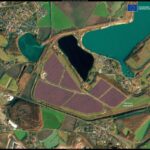Werner syndrome exonuclease promotes gut regeneration and causes age-associated gut hyperplasia in <i>Drosophila</i>
by Kun Wu, Juanyu Zhou, Yiming Tang, Qiaoqiao Zhang, Lishou Xiong, Xiaorong Li, Zhangpeng Zhuo, Mei Luo, Yu Yuan, Xingzhu Liu, Zhendong Zhong, XiaoXin Guo, Zihua Yu, Xiao Sheng, Guanzheng Luo, Haiyang Chen Human Werner syndrome (adult progeria, a well-established model of human aging) is caused by mutations in the Werner syndrome (WRN) gene. However, the expression patterns and functions of WRN in natural aging remain poorly understood. Despite the link between WRN deficiencies and progeria, our analyses of human colon tissues, mouse crypts, and Drosophila midguts revealed that WRN expression does not decrease but rather increases in intestinal stem cells (ISCs) with aging. Mechanistically, we found that the Drosophila WRN homologue (WRNexo) binds to Heat shock 70-kDa protein cognate 3 (Hsc70-3/Bip) to regulate the unfolded protein response of the endoplasmic reticulum (UPRER). Activation of the WRNexo-mediated UPRER in ISCs is required for ISC proliferation during injury repair. However, persistent DNA damage during aging leads to chronic upregulation of WRNexo in ISCs, where excessive WRNexo-induced ER stress drives age-associated gut hyperplasia in Drosophila. This study reveals how elevated WRNexo contributes to stem cell aging, providing new insights into organ aging and the pathogenesis of age-related diseases, such as colon cancer.
by Kun Wu, Juanyu Zhou, Yiming Tang, Qiaoqiao Zhang, Lishou Xiong, Xiaorong Li, Zhangpeng Zhuo, Mei Luo, Yu Yuan, Xingzhu Liu, Zhendong Zhong, XiaoXin Guo, Zihua Yu, Xiao Sheng, Guanzheng Luo, Haiyang Chen Human Werner syndrome (adult progeria, a well-established model of human aging) is caused by mutations in the Werner syndrome (WRN) gene. However, the expression patterns and functions of WRN in natural aging remain poorly understood. Despite the link between WRN deficiencies and progeria, our analyses of human colon tissues, mouse crypts, and Drosophila midguts revealed that WRN expression does not decrease but rather increases in intestinal stem cells (ISCs) with aging. Mechanistically, we found that the Drosophila WRN homologue (WRNexo) binds to Heat shock 70-kDa protein cognate 3 (Hsc70-3/Bip) to regulate the unfolded protein response of the endoplasmic reticulum (UPRER). Activation of the WRNexo-mediated UPRER in ISCs is required for ISC proliferation during injury repair. However, persistent DNA damage during aging leads to chronic upregulation of WRNexo in ISCs, where excessive WRNexo-induced ER stress drives age-associated gut hyperplasia in Drosophila. This study reveals how elevated WRNexo contributes to stem cell aging, providing new insights into organ aging and the pathogenesis of age-related diseases, such as colon cancer.


































































































































































.jpg)
.jpg)
.jpg)





